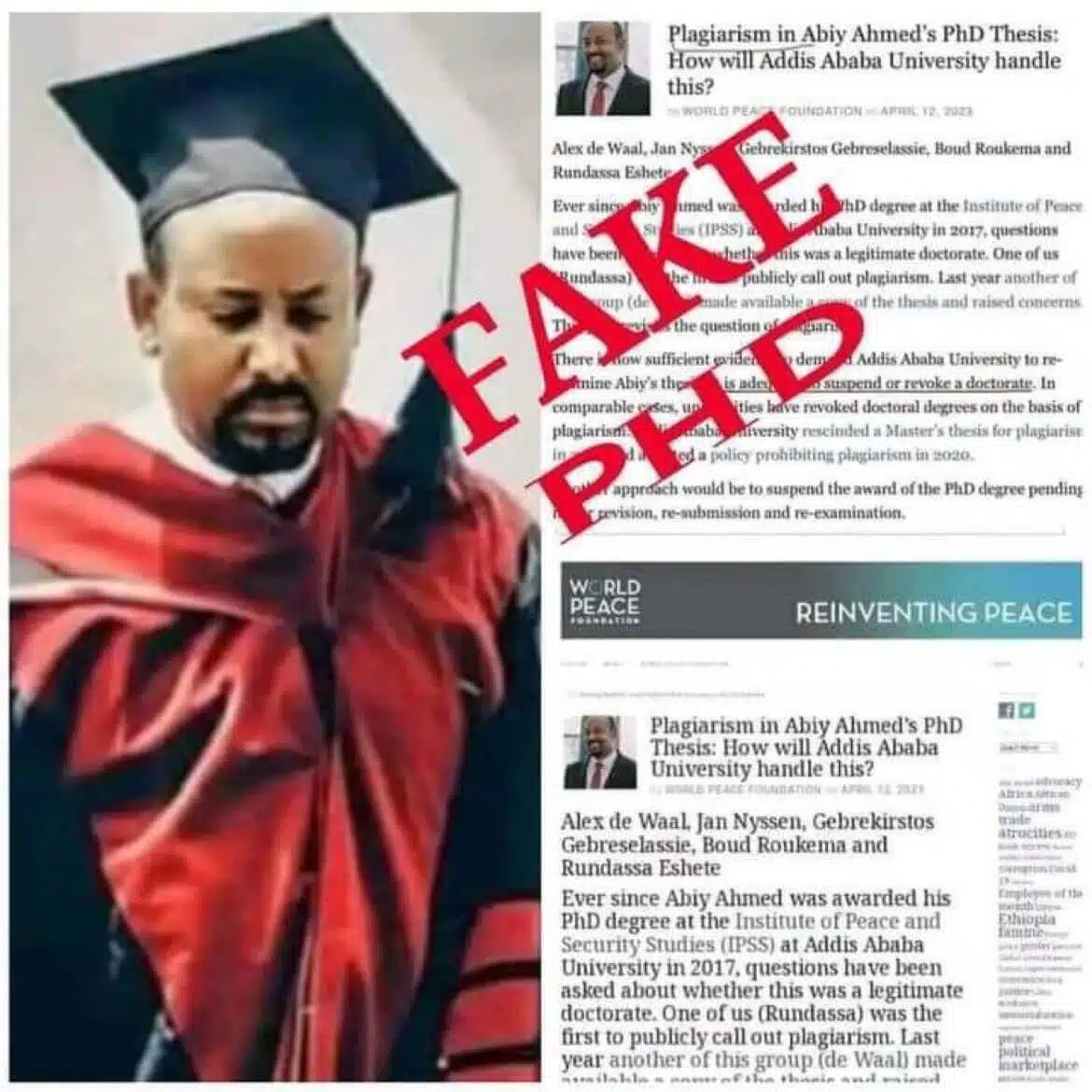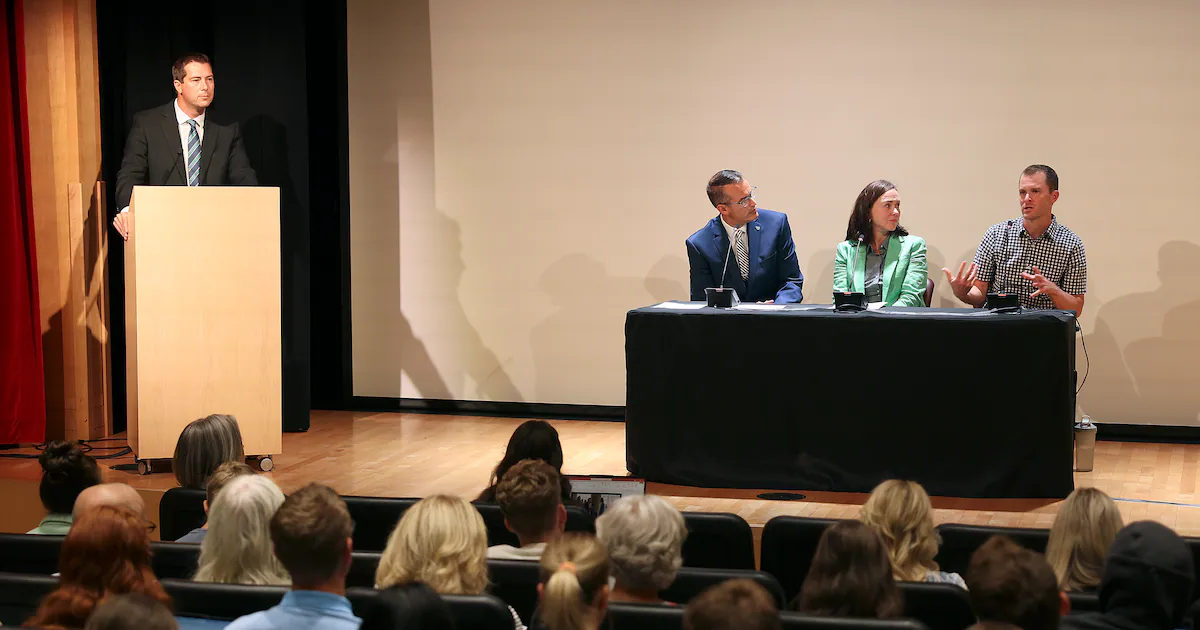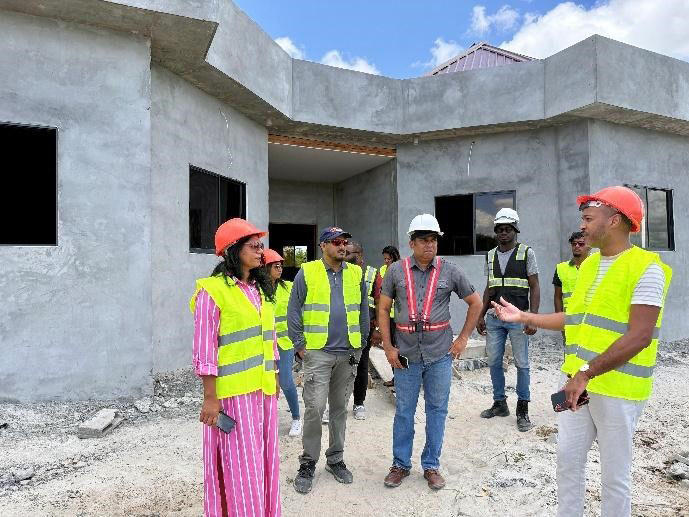By The Habesha
Copyright zehabesha

Plagiarism in Abiy Ahmed’s PhD Thesis: How will Addis Ababa University handle this? Allegations around the PhD thesis have persisted since 2017. Checks on the literature review chapter reportedly show a high similarity score (about 62–64% after exclusions), raising urgent academic integrity concerns for Addis Ababa University.
What should the university do next? Policies against plagiarism exist, and there are global precedents for action. Possible responses include:
Re-examination of the thesis by independent experts
Temporary suspension of the award pending major revision and re-defense
Formal findings that could revoke the degree if misconduct is confirmed
This article reviews the evidence, the university’s rules, relevant precedents, and the options ahead for Addis Ababa University. Plagiarism in Abiy Ahmed’s PhD Thesis: How will Addis Ababa University handle this?
Overview of Abiy Ahmed’s PhD Thesis
Abiy Ahmed’s PhD thesis, titled “Social Capital and its Role in Traditional Conflict Resolution: The Case of Inter-religious Conflict in Jimma Zone,” was completed at the Institute for Peace and Security Studies (IPSS), Addis Ababa University, in 2017. The research focused on how social capital helps traditional conflict resolution and aimed to show practical solutions drawn from Ethiopia’s diverse local communities. Abiy’s work was praised for highlighting local approaches to peacebuilding and was one of the milestones in his academic and political journey. However, later detailed investigations revealed that large portions of the thesis, especially the literature review, heavily relied on uncited and copied material from various other academic sources.
Timeline of the Allegations
The first small whispers and criticisms about Abiy Ahmed’s thesis started circulating shortly after he became Prime Minister in 2018. However, it was not until April 2023 that serious plagiarism allegations broke into public view. Major blogs, academic watchdogs, and independent researchers began to publish findings based on comprehensive text-analysis tools like Turnitin, which pointed to systematic copying throughout the thesis. Throughout 2023 and into 2024, these reports intensified. Addis Ababa University faced mounting public pressure to conduct a formal investigation. By late 2024 and early 2025, news sites and popular forums discussed how over 60% of some sections were classified as plagiarized, especially the literature review chapter. The debate spilled into Ethiopian media and social channels, with the topic becoming one of the most discussed academic issues in the country.
Major Figures Involved in the Exposé
The exposé of Abiy Ahmed’s alleged plagiarism involved several key individuals and groups. Leading the charge were international scholars like Alex de Waal of the World Peace Foundation, who systematically examined the thesis and published detailed reviews of the copied material. Some insiders at Addis Ababa University anonymously leaked internal documents and similarity reports, further stoking the fire. Social media users, online Ethiopian academic communities, and independent blogs also played significant roles, collecting evidence and amplifying the debate. Certain local journalists and opinion writers brought international attention to the topic, going so far as to criticize both the thesis and the university’s slow official response. Finally, Turnitin software analyses presented by investigative bloggers served as a technical backbone for these public claims, offering hard data that coverage could reference.
The collaborative exposure relied on a mix of digital sleuthing, international academic expertise, and persistent public discussion, making this a deeply collective investigation into the integrity of a national leader’s academic credentials.
Details of the Alleged Plagiarism
Plagiarism Detection Process and Software Used
Plagiarism detection in Abiy Ahmed’s PhD thesis relied heavily on digital tools. Turnitin, one of the world’s most widely used plagiarism detection programs, was central to this investigation. Turnitin scans academic documents, comparing them against published books, articles, student submissions, and web content to identify unoriginal text and improper citations. In the case of Abiy Ahmed’s thesis, the software was used to check the bulk of the manuscript, focusing especially on sections suspected of unoriginal content.
Independent analyses also supplemented the process, with researchers and academics running parts of the thesis through Turnitin multiple times. Some reports referenced a secondary scan that adjusted for exclusions such as references and bibliography, to ensure results focused on actual narrative content. This rigorous approach aimed to address claims fairly and scientifically.
Turnitin Analysis and Similarity Scores
Turnitin’s analysis of Abiy Ahmed’s thesis produced remarkably high similarity scores, indicating substantial overlap with existing sources. The most widely cited result revealed a 62% similarity score for Chapter 2, the literature review. Other analyses yielded up to 64%. These percentages mean that nearly two-thirds of this chapter’s content matched other already published texts.
In practical terms, reports highlighted that 41 out of the 150 total pages—primarily in the literature review—were found to be direct copies or very close paraphrasing from other sources. Turnitin’s breakdown enabled reviewers to see exactly which sections and paragraphs paralleled other academic works, focusing attention on problem areas.
Specific Sections Affected (Literature Review, Fieldwork, etc.)
Specific sections most affected by plagiarism allegations include the literature review and theoretical background. According to multiple detailed reports and reviewers’ findings, every single page of the literature review (Chapter 2) contained at least one paragraph or more copied verbatim or with minimal paraphrasing from outside works.
No major reports so far have implicated the fieldwork results or the original data analysis sections in the same way. Most attention is on theoretical material that laid the academic groundwork for the rest of the dissertation, which should have demonstrated a critical synthesis in the student’s own words.
Sources Identified as Plagiarized
Detailed appendices from investigations have listed dozens of sources that appeared as direct matches to Abiy Ahmed’s thesis content. These include:
Classic and recent academic articles in sociology and development studies
Books commonly cited in social capital research
Unpublished theses and dissertations from other universities
Material from online academic repositories
Forensic reports even mapped passages line by line, showing how entire paragraphs were lifted, sometimes with only slight modifications or rewordings. The World Peace Foundation made public a comparative document that directly matched the thesis pages to the corresponding sources.
Limitations of Plagiarism Detection Tools
While tools like Turnitin are very helpful, they also have important limitations. They catch word-for-word copying and close paraphrasing, but may miss plagiarism involving translation from another language, heavy summarization, or content that is not yet in their database (such as new books or unpublished material).
Turnitin can sometimes flag false positives by matching commonly used academic phrases or reference lists—not true plagiarism. Additionally, detection software cannot always assess intent to deceive or the context in which matching text appears. Sometimes, high similarity is justified by correct citations, though this was reportedly not the case for much of the thesis in question.
Another challenge is that some content—especially unpublished or obscure local documents—is not present in Turnitin’s library, letting a certain amount of plagiarism slip through undetected. Thus, expert manual review remains essential to fairly judging academic misconduct.
In conclusion, the investigation into Abiy Ahmed’s PhD thesis used advanced software tools and careful review to identify alleged plagiarism, but also had to work within the limits of these digital systems.
Addis Ababa University’s Official Position
Addis Ababa University’s official position on the plagiarism allegations against Prime Minister Abiy Ahmed’s PhD thesis has been marked by caution and controversy. After the World Peace Foundation and other credible sources documented that over 60% of key thesis chapters had clear, detectable plagiarism, many expected a swift reaction from the university. However, Addis Ababa University declined to launch a formal investigation or consider revoking the PhD degree (Borkena). Several reports suggest that the university justified its stance with reference to the passage of time since the degree’s conferral and the supposed sufficiency of the thesis’ original plagiarism checks. Turnitin software was reportedly used when the dissertation was first submitted, and the document was said to have ‘passed all necessary inspections’ at the time (etd.aau.edu.et). Many believe the university’s current hesitation is linked to concerns over political repercussions. Faculty and academic overseers have issued no new revisited statements, even after the recent media exposure.
Academic Community and Public Opinion
Academic community and public opinion in Ethiopia reflect deep divisions and a sense of disillusionment. Many academics express shock that such a high-profile case, with well-documented evidence of widespread cut-and-paste plagiarism, is not being properly addressed by academic authorities (World Peace Foundation). Some professors have called for an independent, transparent inquiry into the allegations, fearing long-term damage to the credibility of Ethiopia’s higher education system. In the broader public, frustration and anger are common responses, especially on social media and diaspora forums. Numerous Ethiopians see the university’s lack of action as part of a much wider problem of accountability and integrity among national elites. The allegations have fueled wider debates about academic standards in the country, and brought forward stories of ghostwriting and thesis buying that many in the community say are alarmingly widespread.
Comparisons to Previous Cases in Ethiopia
Comparisons to previous cases highlight how Abiy Ahmed’s case is not unique, but it is the most prominent and consequential. Ethiopia has seen earlier accusations of university plagiarism and academic dishonesty, some involving public officials. For example, a report on Zenodo documents previous cases where MSc and PhD theses by various politicians and university officials, including Abraham Belay (2007) and Takele Uma (2014), have also been accused of plagiarism (Zenodo). However, these cases rarely gained such international attention, nor did they involve national leaders at the level of a sitting prime minister. Studies on academic dishonesty in Ethiopian higher education have pointed out longstanding gaps in enforcement and consequences (ResearchGate). The Abiy case is therefore seen as a test of whether Ethiopia’s top universities can apply their own rules without fear or favour.
Influence of Political Context on University Decisions
Influence of political context over university decisions has been one of the main themes in the entire scandal. Many observers argue that political pressures have directly influenced why Addis Ababa University has not moved forward with an independent investigation (Borkena). With Abiy Ahmed serving as both Prime Minister and a past notable alumnus, the stakes are unusually high for anyone within the university to publicly question the degree. Some media reports and academic forums suggest fear of political retribution and institutional self-censorship are widespread in this context, especially given prior examples of reprisals in public sector cases. Public debates now often connect the PhD plagiarism issue with broader worries about government influence over universities and the decline of independent academic standards in Ethiopia.
Overall, the responses and reactions to the allegations show how academic integrity and political realities are deeply intertwined in Ethiopian higher education today.
Broader Academic and Political Implications
Impact on Academic Integrity in Ethiopia
Academic integrity in Ethiopia is facing tough questions after the plagiarism allegations against Abiy Ahmed. When high-profile public figures are accused of academic misconduct, it affects the whole educational environment. Students, researchers, and teachers may lose faith in strict rules about honesty in research. If leaders are not held to high standards, people might start thinking that cheating or copying is normal. This weakens the trust in degrees from Ethiopian universities and lowers the value of academic qualifications.
Educational institutions must now work harder to promote honesty and originality. Many experts say universities should use advanced plagiarism detection tools and clear rules to stop similar scandals. If not, young academics may feel that hard work and ethical research do not matter as much as personal connections or political power.
Precedents in Other Countries: Political Plagiarism Cases
Cases of political plagiarism are not unique to Ethiopia. In several countries, top politicians have faced similar accusations. These scandals often lead to intense debates about the relationship between politics and education, as well as the importance of setting a good example for students and researchers.
In most cases, the reaction depends on the local political culture. Sometimes, universities act quickly to protect their reputations. Other times, there are long investigations or public disagreements over what should happen next.
Germany, South Africa, Russia—International Examples
In Germany, several politicians lost their doctoral degrees after their theses were found to include copied material. The most famous case is Karl-Theodor zu Guttenberg, a defence minister, who had his PhD revoked in 2011. Germany’s strict academic standards required public investigation and removal of his title, leading to his resignation.
In South Africa, former ANC Youth League leader Julius Malema faced community criticism for alleged academic shortcuts, though not as public as the German cases. Still, the discussion triggered changes in how universities review politicians’ qualifications.
Russia has also seen prominent cases. Vladimir Putin and many other officials have faced claims of plagiarism in their academic theses. However, in Russia the outcomes are rarely as serious. Sometimes, authorities do not take action or the stories remain underreported.
These examples show that how a country deals with plagiarism often reflects the strength of its academic rules and the independence of its institutions.
The Role of Academic Credentials in Ethiopian Politics
Academic credentials in Ethiopian politics carry a lot of symbolic power. Many politicians display university degrees to prove their knowledge and honesty. A doctorate, especially, can strongly influence public opinion and political image.
When leaders are accused of academic dishonesty, it does not just harm their reputation. It can also damage public trust in officials and the institutions that awarded their degrees. Citizens may start to question whether some leaders have earned their qualifications honestly, or if political influence played a part.
This situation increases pressure on universities and political parties to act transparently and responsibly. It also encourages society to value real learning and honest achievement over fake or stolen academic success. The Ethiopia plagiarism case is a reminder of how important education is to the nation’s future, both in politics and beyond.
Potential Outcomes and Recommendations
Possible Actions for Addis Ababa University
When major plagiarism allegations arise against a public figure like Abiy Ahmed, Addis Ababa University comes under intense public and academic scrutiny. The university must follow clear regulations and academic traditions when responding to such claims. The decisions the university takes affects not only its reputation but also the wider Ethiopian academic community.
Revocation of Degree
Revocation of degree is one of the most serious actions Addis Ababa University can consider. If investigations confirm that plagiarism in Abiy Ahmed’s PhD thesis reaches a severe level, the university may be forced to invalidate the awarded doctorate. This process is usually guided by the university’s code of academic conduct, which allows for rescinding degrees if academic fraud is proven. This is a difficult step, as it impacts the individual’s career and the university’s prestige, but it also sends a clear message on upholding academic standards.
Suspension Pending Re-examination
Suspension pending re-examination offers a more cautious route. Addis Ababa University could temporarily suspend the degree status while launching an in-depth investigation into the thesis. During this period, an independent committee or external experts may review the work. The aim is to ensure a fair and transparent process, giving the accused a chance to respond, while safeguarding academic integrity.
Calls for Transparent Investigation
Calls for a transparent investigation are now widespread in Ethiopian academic and media circles. Many believe Addis Ababa University should publicly disclose its investigation process, including the members of the review committee and their findings. Public trust depends on seeing that the inquiry is objective rather than influenced by politics or personal alliances. Transparency would also help rebuild confidence in the university’s academic standards.
Consequences for Higher Education Standards
Consequences for higher education standards could be far-reaching. If Addis Ababa University addresses the case properly, it can strengthen public faith in higher education. Otherwise, ignoring or downplaying the scandal might create an impression that academic cheating is tolerated at even the highest levels, risking a culture of dishonesty. Such a precedent could discourage honest students and researchers. Ethiopian universities need to reinforce their commitment to academic honesty to attract international partnerships and boost their own graduates’ credibility.
Implications for Other Degree Holders and Institutions
Implications for other degree holders and institutions are significant as well. If standards seem lax for one, others may question the value of their own hard-earned degrees. This could lower morale among students and alumni, making them worry that their accomplishments are being devalued in the eyes of employers or academic partners. Additionally, other universities in Ethiopia might face pressure to review their own past degrees or strengthen their procedures to avoid similar scandals.
Policy Recommendations for Future Academic Integrity
Policy recommendations for future academic integrity should emphasize prevention and swift response to academic misconduct. Addis Ababa University and other Ethiopian institutions can:
Strengthen thesis supervision and advising processes.
Require all dissertations to undergo advanced plagiarism detection checks (like Turnitin).
Provide training on academic ethics for both faculty and students.
Create a clear, public protocol for investigating allegations.
Invite independent experts to participate in sensitive cases.
These steps not only protect the reputation of universities in Ethiopia but also promote a healthier, more honest academic environment. By acting decisively, institutions can show that academic credentials in Ethiopia are built on true merit and original work.
Examination of Leadership Ethics and Public Trust
Intellectual Integrity and Symbolic Power in Leadership
Intellectual integrity is a value that matters a lot in leadership. Leaders are often seen as role models, so their actions send a strong message to the public. In the case of political leaders like Abiy Ahmed, the integrity of their academic achievements carries a powerful symbolic weight. When a leader gains a degree honestly, it shows that hard work, honesty, and learning are valued at the top. If any form of dishonesty, like plagiarism, is discovered, it can weaken people’s trust in both the leader and the institutions involved.
Symbolic power means that whatever a leader does is watched and imitated by the society. Their behavior shapes the standards and culture of a country. Allegations of academic dishonesty may lead the public to question not only personal ethics but also the strength of ethical standards in education and politics. This shows how serious such cases are, far beyond personal embarrassment—they question the very foundation of trust on which leadership stands.
Community Mobilization Around Academic Honesty
Community mobilization around academic honesty happens when people—students, teachers, activists, and ordinary citizens—come together to defend the value of original work. In Ethiopia and beyond, instances of high-profile plagiarism can spark public conversations about academic integrity. Social media platforms, student unions, and academic networks may host debates, campaigns, and petitions calling for transparency and strict enforcement of standards.
These collective actions do more than just hold one person accountable. They raise awareness about why academic honesty matters for societal progress. When communities demand strict investigation and fair judgment, they remind everyone that fighting plagiarism is not only a personal issue but a public one that involves everyone who cares about education and truth.
Safeguarding Recognition of Original Innovators
Safeguarding recognition of original innovators is key to protecting the progress of science, technology, and society. When a person copies the work of others without credit, it is not only an ethical problem—it also discourages true innovation. Innovators, researchers, and creative thinkers must be given credit for their ideas. This encourages new discoveries, supports a healthy academic environment, and keeps people motivated to contribute.
When leaders are involved in plagiarism scandals, it risks sending a message that copying is tolerated at the highest levels. It is crucial that institutions, whether academic or governmental, act to defend the recognition of original work. This means careful investigation, transparency in process, and due praise for those who truly deserve it. Only by protecting the rights of innovators can a country maintain a culture of real achievement and trust.
Background of the Plagiarism Allegations
Overview of Abiy Ahmed’s PhD Thesis
Abiy Ahmed’s PhD thesis, submitted to Addis Ababa University in 2017, is titled “Social Capital and its Role in Traditional Conflict Resolution: The Case of Inter-religious Conflict in Jimma Zone.” The main focus of the thesis is on how social capital influences traditional conflict resolution strategies, especially in the context of inter-religious disputes in the Jimma Zone of Ethiopia. The work claims to provide insights into peacebuilding by blending social theory with field research on local practices. The thesis has since been referenced in various policies and has influenced Abiy Ahmed’s political brand, especially after he became Ethiopia’s prime minister.
Timeline of the Allegations
The plagiarism allegations against Abiy Ahmed’s PhD thesis emerged publicly in April 2023. A detailed investigation was conducted by the World Peace Foundation, which published a report showing that large portions of the thesis, especially Chapter 2, closely matched passages from previously published works, without proper attribution. The same month, these findings quickly spread on platforms like Reddit and Twitter, sparking intense debate. The university was then urged by academics and the public to review the degree. Despite these calls, as of late 2023, Addis Ababa University had not taken formal action on the matter, stating concerns about possible institutional repercussions. Over the next months, scholars continued to analyze the thesis, while the story attracted international media attention in 2024 and 2025, especially after more insider leaks and prominent academics weighed in.
Major Figures Involved in the Exposé
The plagiarism exposé was mainly driven by Alex de Waal, a respected scholar at the World Peace Foundation. His research, published both on the Foundation’s site and on ResearchGate, provided a systematic page-by-page breakdown of similarities between Abiy’s thesis and other published academic works. Other influential voices included Ethiopian diaspora academics, activists, and prominent journalists. Social media figures and users on Reddit and X (formerly Twitter) helped amplify the findings. Several reports highlight how insiders at Addis Ababa University and whistleblower academics contributed data and background to the exposés, although most have stayed anonymous due to the sensitive political nature of the allegations. These figures collectively pressured the university and triggered wider societal debate about academic integrity in Ethiopia.



